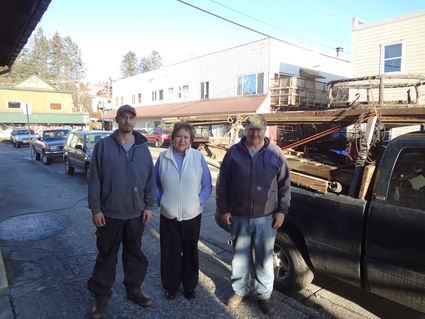Local IGAP elder cleanup comes to close

Dan Rudy/ Wrangell Sentinel
Perry Butler, Carol Snoddy and Richard Oliver stand outside a work truck laden with one of the last loads of Wrangell's IGAP Native elder property cleanup program. Working part-time since October, the group has helped clean up about 65 properties in the Wrangell area.
Tomorrow the local Indian Environmental General Assistance Program (IGAP) office will conclude its elder property cleanup program, which was first started in October. The need had been one of those identified through listening sessions hosted last year by IGAP and the Wrangell Cooperative Association.
Operating through an Environmental Protection Agency grant, the program first sought out elderly residents within Wrangell's Native community who needed help collecting and disposing of various unwanted items.
By the end of December, the program had assisted 41 Native households with property cleanup. Through efficiency, the office stretched its grant even further. The office's environmental director, Carol Snoddy, estimates they will have serviced 65 families by the project's end.
"I just want to say thank you to the EPA for funding not only our annual IGAP program, but for funding the special side project of Native property cleanup," she said.
IGAP operates under the purview of the Environmental Protection Agency, in Alaska seeking to build working partnerships with 30 Native groups across the state in order to improve quality of life. In Wrangell, that partner is the WCA.
IGAP's primary focus is to create sustainable solutions to environmental and quality of life problems, working with local actors and facilitating contact between them. Different IGAP offices also share ideas for solving similar issues, forming a wider knowledge pool.
For the part-time cleanup project, locals Richard Oliver and Perry Butler were hired.

"It's kind of rewarding to clean up Wrangell," Oliver commented. He and Butler had previously been employed by IGAP for its dumping site cleanup project last year.
Together they went to people's homes and filled their pickup with a wide variety of old equipment, broken appliances, accumulated junk and yard trash. Some of the larger items included old oil tanks and a pair of old vehicles long past usability.
"We get a lot of gratitude," said Butler. "A lot of happy people."
The pair would then transport, separate and dispose of these at the landfill. Not everything went to waste, however.
"We've been separating all the materials out," said Oliver. "If we can recycle it then we will."
For instance, while clearing some clutter from behind one resident's woodpile, they threw in the wood as well. Butler brought much of that to his grandmother.
"She was really happy about it," he said.
The program started with a $20,000 grant applied for last summer by previous IGAP coordinator Trevor Keller.
"I had a heck of a time spending it," said Snoddy. Despite hiring on and outfitting two workers for the task, her office still had to seek an extension to use the funds.
Snoddy said she will consult the WCA board to see if the remaining $700 can be reappropriated for use in IGAP's net collection project, also initiated by Keller in the fall. Enough nets to fill 15 of the 2,500-pound bags provided by Trident Seafoods have since been gathered at the receptacle set up by the landfill. These need to be prepared for transport to Petersburg, where the Petersburg Indian Association has arranged to recycle them through Aquafil, an international engineering company. The collected nets will be shipped to Slovenia for processing.



Reader Comments(0)